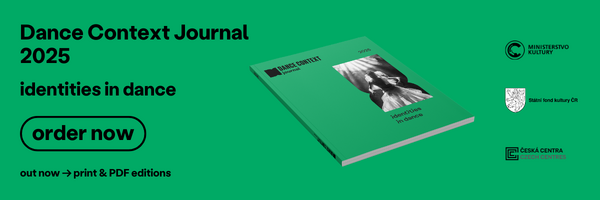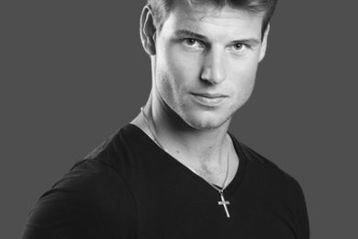When did you start with classical ballet?
When I was about thirteen, my former teacher told me that she cannot teach me more, so if I wanted to move on, I should try a better school. But it is not possible in the south of Italy. She knew a former dancer Elisabetta Hertel, who opened a dance academy in Florence a few years before. She arranged me private practice with Elisabetta, but I was just after a leg injury and I could not dance to the fullest, so she advised me to have dance only as a hobby. But also - if I’ll have interest, I can come and try out for one summer month course, after which the entrance exams would be held. My parents asked me if I really wanted to be a dancer, because a private school, accommodation in a foreign city… everthing is extremely expensive. But I wanted to. When I arrived in Florence, Elizaberra Hertel could not recognize me: "This is a completely different boy than I saw." So at 14 years old I joined the Accademia Internazionale Coreutica where I started with ballet training.
What was it for you to come at the time of puberty alone to nearly 800 kilometers away Florence?
I was always very shy and "mammone" (Italian for mama's boy), so it was very difficult. But the passion has led me and I knew that if I wanted to be a dancer, I have to do it. At school I was for 5 years and in that time I have improved a lot, Elizabetta Hertel helped me tremendously. She was the most important person to me in every aspect, not only in ballet, but in life - how I am, how I think, how I behave. She was like a second mother. At puberty, one thinks of oneself, and yet must take care of himself, cook, clean the house ... I had to grow up faster than my peers.
What was the system in your school? Was it different from conservatories which we know in the Czech Republic?
The system is completely different as this was only dance academy. From eight to two I went to a normal high school and then until eight in the evening I was in dance classes. It was even more challenging because while at Czech conservatories, the academic classes are organised with regard to training, but in the academy this is not taken into account. Therefore after three years I decided to leave school and focus only on ballet.
Most of the Italian dancers from the National Theatre studied at Milan's famous academy at La Scala. Were you tempted to go there too?
I've never even tried it there. My school was very small - the entire school was no more than 15 students, each teacher gave us a very intense attention - and so then it was so hard. One year I was only one boy, so everyone concentrated on me. But finally it was good. I had no reason to change school just because they had a much bigger name.
After school you received and offer of contract in the US - what preceded it?
When I was in fourth year, Ivan Cavallari, with whom my teacher danced in Stuttgart, offered me to dance for three months in the Sleeping Beauty in the West Australian Ballet in Perth. It was a small company, not enough dancers for this production, so they needed to find more people. I had the opportunity to experience what it's like to be a true dancer in the theater, how my life would be in the future! In the last year I was searching for a contract, I tried maybe 12 or 13 auditions, but they never said yes, I was quite upset. But my teacher sent me to the international competition in Italy and in the USA. And thanks to the competition in Orlando, where it was quite like an audition, there were many theater directors and also there was a broadcast, I was offered two contracts - ballet in Orlando and Washington Ballet. I chose Washington, the director there was very nice, told me straight what roles will he have for me.
But in the end you are in Prague. What influenced your decision?
I would always rather stay in Europe. Europe seemed more interesting place to explore what dance is. The United States is the perfect place to dance, but not for me in this moment. Even before I was offered an engagement in America, I sent DVD with my class to various theaters, including the National Theatre in Prague. That day, when I had to sign a contract for Washington Ballet, Petra Šifnerová called my teacher that they had a place for me in the National Theatre. At that moment I was probably the happiest person in the world.
What were your beginnings in the National Theatre? Do you remember your first role?
It was pretty difficult. I started in August, but the first time I got on stage was at the end of October. For a young dancer after school, who has so much power, energy and desire for the stage, it was incredibly depressing and frustrating. Once I met Petr Zuska in a corridor and he told me: "I see how unhappy you are, but don’t worry, your time will come." And he was right, I'm doing so much beautiful stuff now! The first was Swan Lake by Kenneth Greve. I did one of the cadets in the first act and Spanish dance.
You appear in the roles of classical and contemporary repertoire. Which is closer to you?
Ballet is so much harder, it is more strict than modern dance, but I love both. Creating characters in classical ballets, but also feeling free and enjoying my movement in modern productions. I don’t really prefer one. But my favorite is neoclassical ballet.
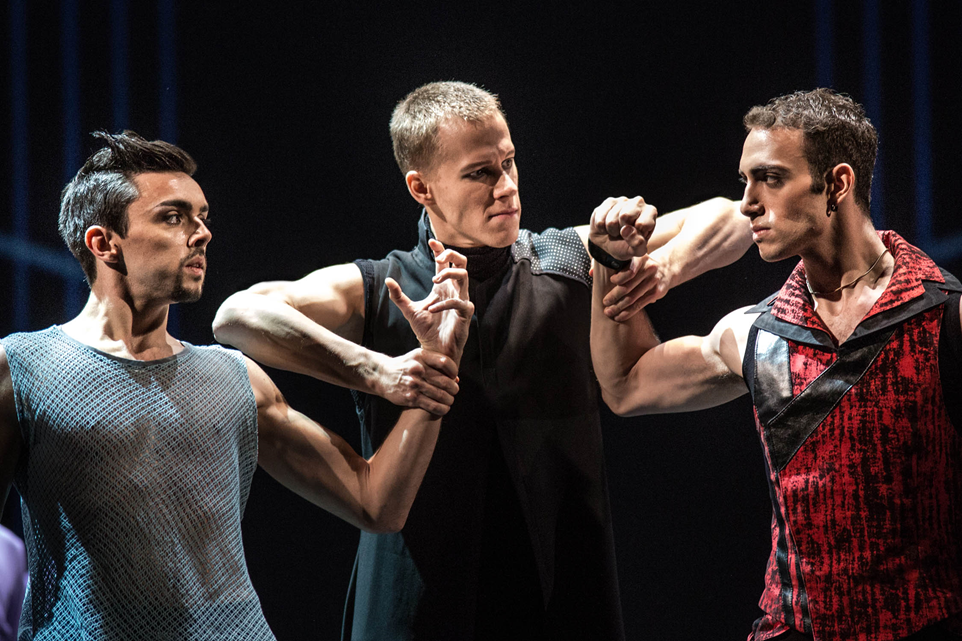
Which role was a turning point for you?
Even in school I absolutely loved In the middle somewhat elevated by William Forsythe, I dreamed about how I danced in it. I first saw the Royal Ballet of Flanders, and later during summer school I worked on it with the director of this company. And one day a few years later, my roommate and a colleague of the National Theatre said: "Vanni, next season we will be doing In the Middle ..." I stared in disbelief, and knew - not that I wanted, but that I needed to dance in this piece. Nothing else interested me. I didnt care. This premiere was the best premiere that I experienced in the company, fulfilling a long-time dream and also a certain satisfaction. To hear the applause from the audience was extremely emotional for me. It was the best thing in which I've ever danced. Really important for my career was the part of the Prince in Sleeping Beauty, the first experience with a leading role. When I came into the National Theatre, I wasn’t a really good partner. I must have done a lot of work, and I was lucky that my partner here was Andrea Kramešová, who was very nice and patient and really helped me.
You also danced the Prince in Swan Lake - both versions by Pavel Ďumbala and Hana Vláčilová in State Opera, as well as the version at the National Theatre, choreographed by Kenneth Greve. What are the differences of these roles?
The State Opera version was much, much easier. So, of course, before I went on stage in the Opera, I thought it was insanely hard, but ... (laughs) The difference is already in the characters. Kenneth himself now came, and worked on the roles with us. His Prince is different. While he is often easily bored and prefers to be alone, there is a lot of smiles, he is communicative, amusing, like most young people. So I can find inspiration for the role in myself, it makes a big difference. A difference is, of course, also in the technique, which is much more difficult in the Kenneth version. I have three solo variations, partnering is difficult, there is an extra duet added at the end. With beautiful music and full of lifts. At that moment I was already completely exhausted and terrified, if I can ever handle it. But that moment in perfect conclusion when I'm on stage alone with my partner, it is absolutely magical. So - I prefer Kenneth’s version much more. It is a pity that we will only have it in April, but at least I have plenty of time to still work on it.
Although audiences have not had the opportunity to meet you otherwise than through your performances on stage, you became a "darling of the audience," often yours is the greatest applause. What do you consider your strengths?
I really don’t know what exactly it is they like. I have always been convinced that it is necessary to work harder and harder. Perhaps the audience knows when a dancer is trying to constantly improve and work on himself. When I dance, I give it absolutely everything, all of my energy, all my emotions, I try to live the character. If you pass the technical aspects, this is what can impress the audience. Maybe this.
If you work on a role where do you look for inspiration?
Most often I find inspiration in myself, in addition, of course, and I watch various videos on Youtube. If the ballet is based on a literary source, I read the book and look at the background of the character. Maybe the role of Tybalt - furious and hateful young man who refuses to accept the relationship of Romeo and Juliet. I wanted that from the first entry it was clear that I'm the "bad guy". In the role of Tybalt I am very happy because I think I find a good way. I always danced differently various princes and similar figures. This was for me is a big change and I enjoy it very much. And I was really happy for a wider nomination for Thalia after this performance.
What kind of characters do you prefer?
Actually, I feel fine in every role I've danced yet. Romantic figures, princes, dreamy, naive, sweet and little bit stupid are closer to my personality (long laugh). They are closer to how I really am. But roles as Tybalt are an amazing opposite.
Speaking of super sweet roles - in Ballet Hommes Fatals you dance Aurora in Sleeping Beauty. You hesitated whether to participate in this project?
(Laughs) I do not know why choreographers decided to give me this role, maybe they think I fit this role. I never hesitated, I agreed immediately. The only thing I was not sure about was working on pointe shoes. After years we work differently, and suddenly "refocus" on the girl's technique, it was very risky. Of course I don’t have so nice feet like girls, so I must change some things. But finally it’s been fun from the first day. I want to do it again and again.
Was there someone who declined the offer to dance with BHF?
Yes, there were couple of people. For some people it would be uncomfortable, for example, to thus "reveal" themselves in front of the audience. I have no problem with that, it is only a mask under which we dance, it’s not us, and it gives me a lot of fun. But for someone it is not comfortable.
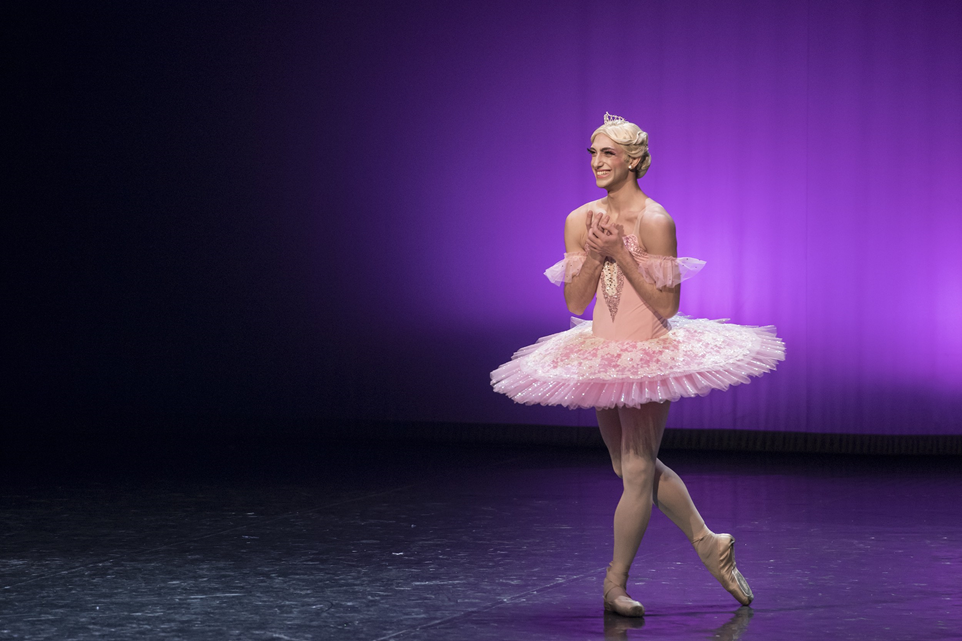
Do you have an idol among the dancers?
Definitely - Friedemann Vogel. For me he is one of the best dancers in the world and to see him dance is always absolutely inspiring for me. I try to take from him a lot. Of course his dance, how he works with his body, how he profiles the characters ... it's all there absolutely amazing. But I also love a lot of ballerinas, like Marianela Nunez, for me this is the equivalent of the best ballerinas today.
On Instagram of National theatre ballet there was photo, that during Terpsichore - Gala performance, which was organized in honor of Ivan Liska, you were among the other stars in the locker room with Friedemann Vogel. How did it feel to be on stage with your idol?
I couldn’t speak with him. I was in the locker room seated next to him and I could not say a word. It is hard to be sitting so close to your idol, just thinking – is it a dream? So I just sat there, staring ahead and the corner of his eye watching him. (laughter)
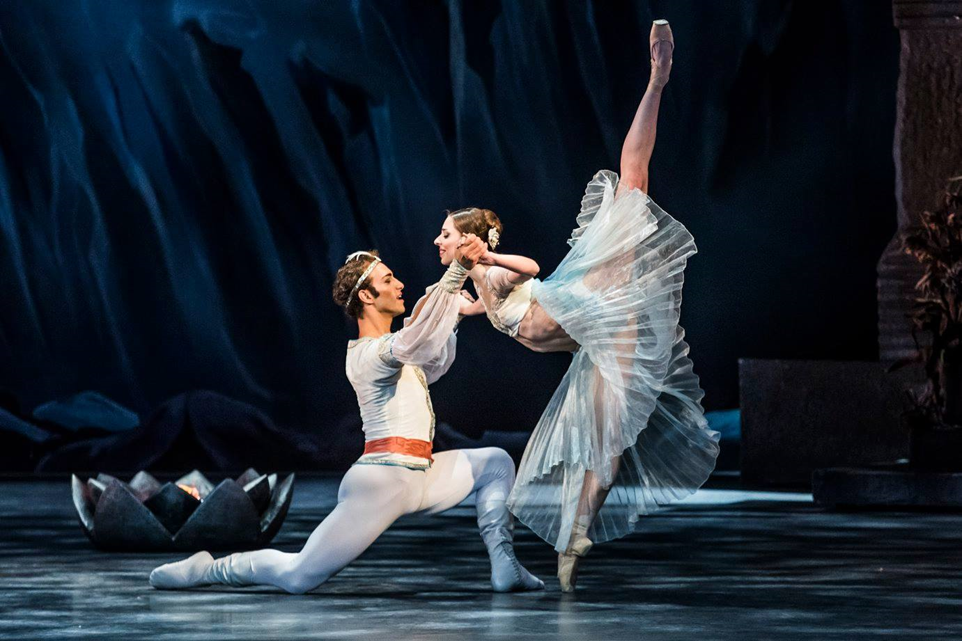
Since this season you are the principal – do you feel a change in your position?
Not really, it's still the same. I'm glad I got the opportunity to show up in most of the leading roles of the classical re pertoire - it should be obvious for a principal. I have the advantage that I am quite universal, so I can dance almost everything (if I am good enough for the role, of course). That’s a big change from the first months in the company (laughter). At the National Theatre, I got a chance to work on myself and I feel that I grew up into a different dancer than what I was before. Along with this, I feel an enormous responsibility. Before “the big ballets”, such as La Bayadere, I’m very nervous. In that ballet I have two dance partners, each with a different technique - it's quite challenging. I myself can feel uncertain. But as the principal, I cannot allow myself that.
Do you have any ballet dreams?
I enjoy what comes to me. Forsythe was a dream come true. And certainly I would be very pleased if some choreographer created a ballet right at me, where I am presented the way I am, not just as a representative of a role.
Finally, I ask – who is Vanni off stage? What does he do in his free time?
I actually do not have any hobbies, sometimes I think I should have them, I know that the lack of hobbies impoverishes me. Actually - I like to draw and paint, it stayed with me from the periods of study in Florence, or I go out with friends. But usually, when I have a moment of free time, I like watching ballet videos. I’m really deep inside the ballet world.
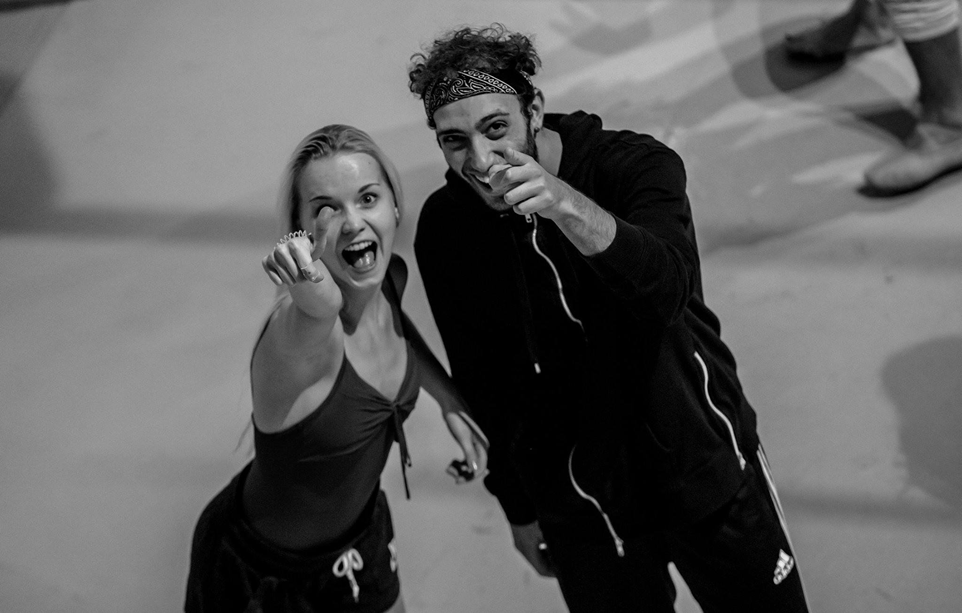
Giovanni Rotolo was born and raised in the southern Italiano Polignano a Mare. From the age of fourteen he studied ballet under the direction of Elisabetta Hertel at the Accademia Internazionale Coreutica in Florence. During his studies he participated in the West Australian Ballet in Perth (artistic director Ivan Cavallari) in a production choreographed by Marcia Haydée Sleeping Beauty. At Rieti Danza Festival 2008 he took third place in the category "junior classical dance", in competition Settimana Internazionale della Danza Spoleto in 2011 he placed third in the category of "senior contemporary dance", also won a bronze medal at the World Ballet Competition in Orlando, USA. Since 2011 he is a member of the National Theatre Ballet in Prague, where in 2013 he become demisoloist, and since 2015 soloist. Before the start of the season 2016/2017 he was appointed principal. He dances in productions Americana III, Moonshine, dance the Prince in an adaptation of Sleeping Beauty Javier Torres and Solor in his La Bayadere, Prince Siegfried in both version of Swan Lake, Tony choreography Jan Kodet Krabat, Dad in The Nutcracker and Cuddly mouse by Petr Zuska, solo in the Field Mass by Jiří Kylián, participated in the Seventh symphony Uwe Scholz, choreographed Reflections on the Fate of Human Forms Jacopo Godaniho and other productions. For his role in In the Middle Somewhat Elevated William Forsythe (2012) and Tybalt in Romeo and Juliet (2013) was in wider nomination for the Thalia Award.

